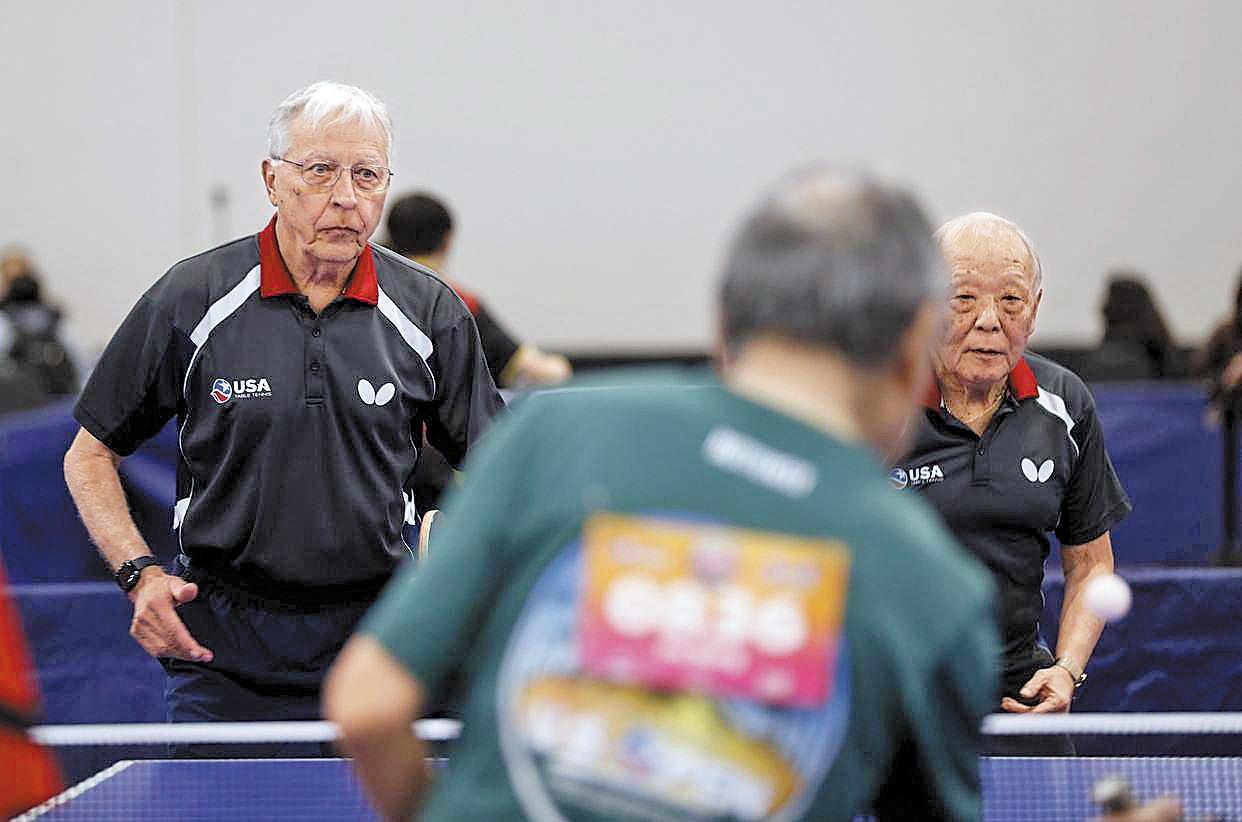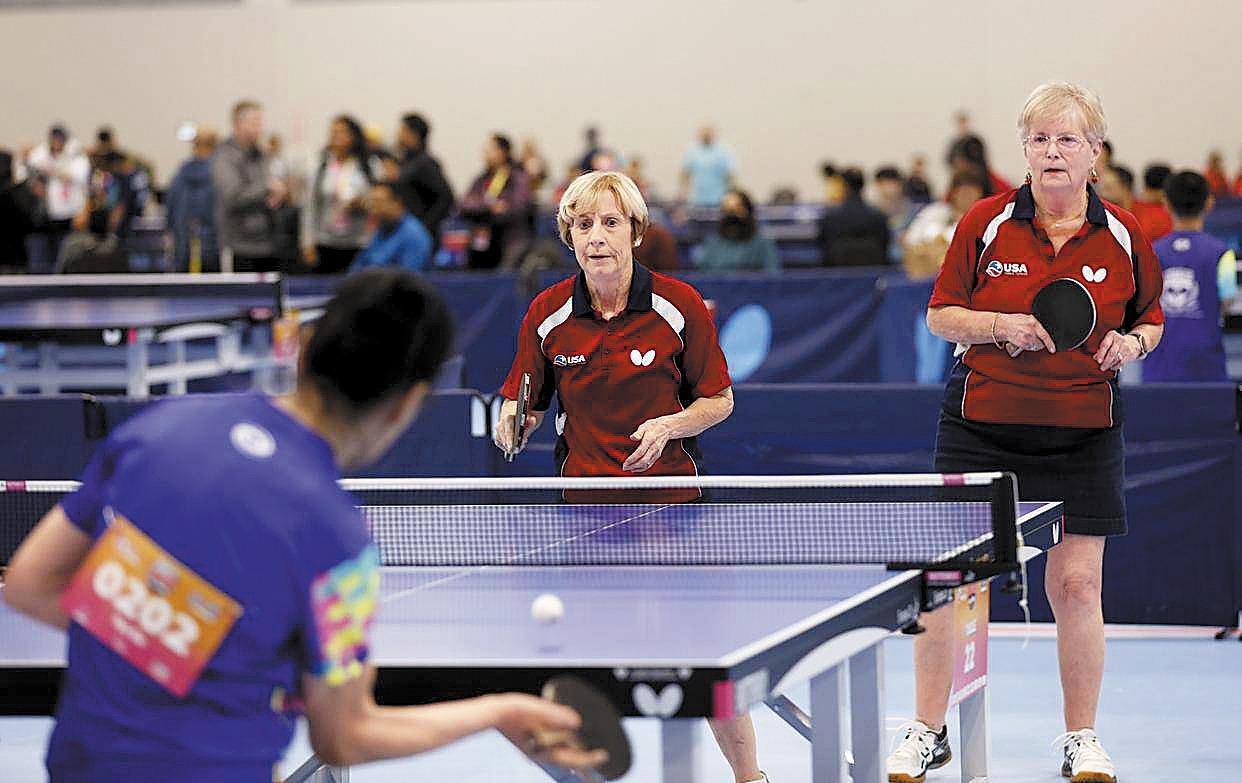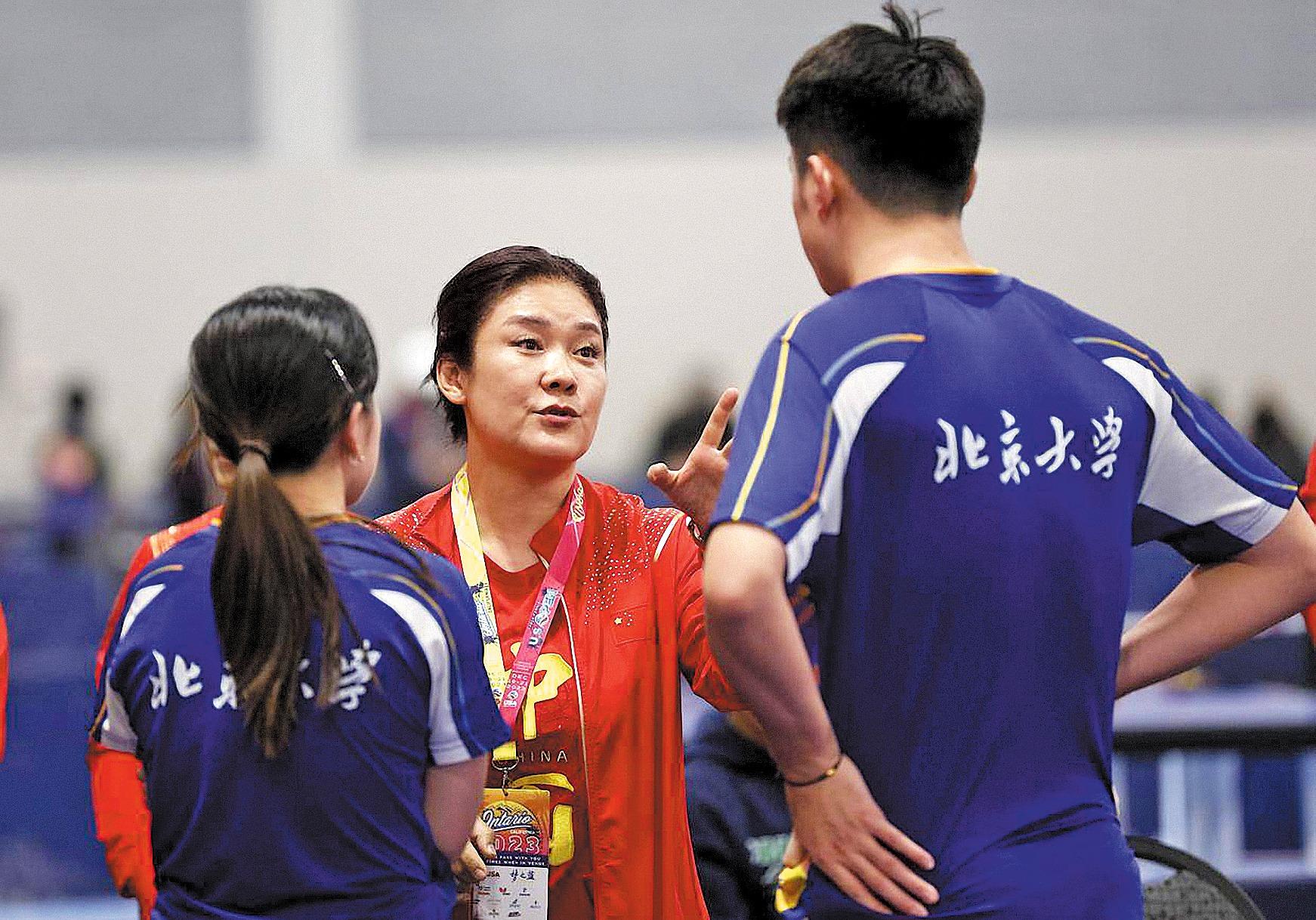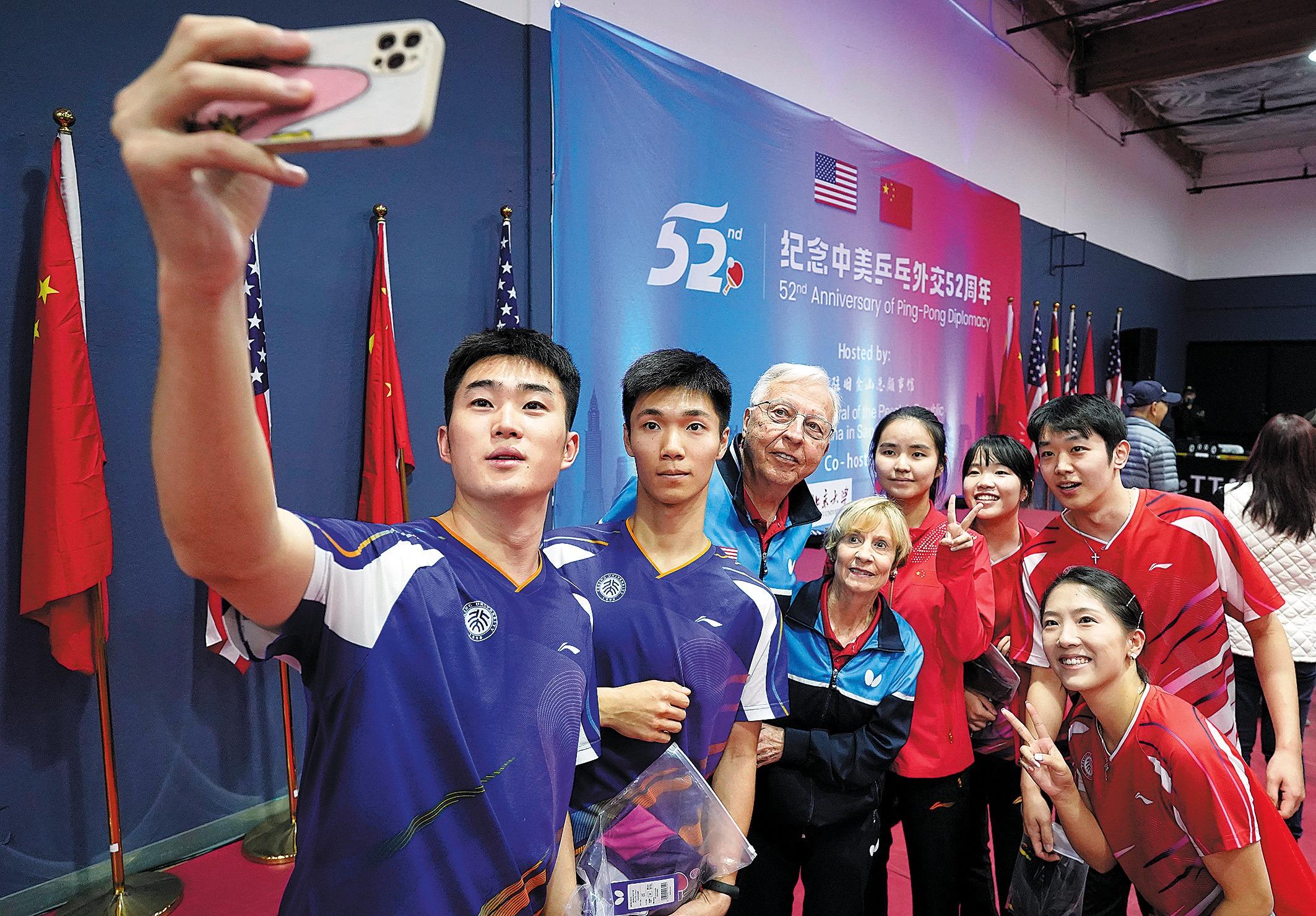Commemoration of US table tennis team’s 1971 China trip sees calls to uphold spirit of friendship
 Veteran table tennis enthusiasts, including 1972 US delegation member Dell Sweeris, and students from Peking University participate in a series of events to mark the 52nd anniversary of Ping-Pong Diplomacy. The celebrations are being held in Washington DC and in the cities of San Francisco, Ontario and Los Angeles in California. (PHOTO / XINHUA)
Veteran table tennis enthusiasts, including 1972 US delegation member Dell Sweeris, and students from Peking University participate in a series of events to mark the 52nd anniversary of Ping-Pong Diplomacy. The celebrations are being held in Washington DC and in the cities of San Francisco, Ontario and Los Angeles in California. (PHOTO / XINHUA)
When Connie Sweeris, then reigning United States national table tennis champion, traveled to China in 1971 on a historic trip that marked the start of Ping-Pong Diplomacy between the two nations, Xie Feng was just a boy of around 7 years old.
Now, 52 years later, Xie, Chinese ambassador to the US, played against Sweeris at the embassy in Washington, in a “game” that drew applause from a hall of spectators.
Their “face-off” on Dec 13 was followed by friendly matches between the visiting Peking University table tennis team and US players to mark the 52nd anniversary of Ping-Pong Diplomacy, which set in motion a thaw in relations between the two countries that had remained chilly since 1949.
Commemoration events, including friendly matches, were also held in San Francisco on Dec 14 and 15, as well as in the cities of Ontario and Los Angeles in California over the weekend.
“My hope is that the younger generation today that play table tennis will carry the Ping-Pong Diplomacy legacy forward, and that even though we have a lot of differences, maybe ideologically, we can be friends, we don’t have to be enemies,” Sweeris said at the event at the Chinese embassy in Washington.
Ambassador Xie agreed. In a speech that followed the match, the envoy talked about the spirit of sportsmanship.
Playing sports is about embracing openness and inclusiveness, and rising above differences. “There is no reason why competitors cannot also be friends,” Xie said.
 Veteran table tennis enthusiasts, including 1972 US delegation member Dell Sweeris, and students from Peking University participate in a series of events to mark the 52nd anniversary of Ping-Pong Diplomacy. The celebrations are being held in Washington DC and in the cities of San Francisco, Ontario and Los Angeles in California. (PHOTO / XINHUA)
Veteran table tennis enthusiasts, including 1972 US delegation member Dell Sweeris, and students from Peking University participate in a series of events to mark the 52nd anniversary of Ping-Pong Diplomacy. The celebrations are being held in Washington DC and in the cities of San Francisco, Ontario and Los Angeles in California. (PHOTO / XINHUA)
The envoy shared an anecdote about Sweeris. On her passport, China was originally listed among the countries it was not valid for traveling to, but US officials took a black marker and crossed out “China” to make the visit possible, he said.
The passport, which was donated by Sweeris to the National Museum of American Diplomacy in Washington, underlines that the seemingly simple cross-off was an act of decisiveness and creativity in line with the trend of the times that remains indispensable today, Xie said.
As the China-US relationship is again at a crossroads, the era calls for drawing wisdom and strength from Ping-Pong Diplomacy, stabilizing and improving the relationship, and ensuring its sound, stable and sustainable development, he said.
“Since China and the US managed to break the 22-year-long ice 52 years ago, we should have even greater confidence today to shake off the Cold War mentality, defy the political correctness, and leap across the trap of major-country conflict,” Xie said.
Jan Berris, vice-president of the National Committee on US-China Relations, who received the Chinese table tennis team in a reciprocal visit to the US in 1972, said she had been involved in thousands of exchanges between the two countries following those first two exchanges in the early 1970s.
“Once we had a chance to meet, to talk, to share experiences, to compete, to get to know one another, we found that, actually, we had many things in common,” she said.
 Veteran table tennis enthusiasts, including 1972 US delegation member Dell Sweeris, and students from Peking University participate in a series of events to mark the 52nd anniversary of Ping-Pong Diplomacy. The celebrations are being held in Washington DC and in the cities of San Francisco, Ontario and Los Angeles in California. (PHOTO / XINHUA)
Veteran table tennis enthusiasts, including 1972 US delegation member Dell Sweeris, and students from Peking University participate in a series of events to mark the 52nd anniversary of Ping-Pong Diplomacy. The celebrations are being held in Washington DC and in the cities of San Francisco, Ontario and Los Angeles in California. (PHOTO / XINHUA)
Dragomir Cioroslan, director of international strategies and development at the US Olympic & Paralympic Committee, said the first exchanges between table tennis players of the two countries was a “groundbreaking” event that marked the start of a new era, characterized by dialogue, cooperation and mutual respect.
Meanwhile, in Ontario, a city about 55 kilometers to the east of Los Angeles, the local convention center buzzed with excitement on Dec 16 as hundreds of players competed in the 2023 US Open Table Tennis Championships.
The tournament drew players from around the world to the southern Californian city. Among them were Wu Bohan and Zhang Yuwen, representing Peking University.
Donning vibrant red jerseys, the pair teamed up in the mixed doubles competition, in the event held at the Ontario Convention Center. For the young students, however, the tournament was more about fostering goodwill than winning titles.
The Chinese pair is participating in the series of events to celebrate the 52nd anniversary of Ping-Pong Diplomacy.
As Dell Sweeris, now a sprightly 78-year-old, watched the intense action at the championship, fond memories came flooding back.
Dell is the husband of Connie Sweeris.
 Players of Peking University’s table tennis team pose for a group photo on Dec 15 , in San Francisco, California, in the US, with Dell and Connie Sweeris, who were part of the team from the United States that visited China in 1971. (PHOTO / CHINA NEWS SERVICE)
Players of Peking University’s table tennis team pose for a group photo on Dec 15 , in San Francisco, California, in the US, with Dell and Connie Sweeris, who were part of the team from the United States that visited China in 1971. (PHOTO / CHINA NEWS SERVICE)
With a smile playing on his lips, he reflected on how a simple game of ping-pong had once bridged political chasms and brought nations closer together.
“I was so fortunate to be on the US national team in 1972 when the Chinese team came here,” Dell recalled. “They sent legends here, including Zhuang Zedong, Li Furong, Zhang Xielin and Zheng Huaiying ... We were so fortunate to have these people and we were able to travel with them.
“I totally agree that ping-pong is a bridge to help people know the world and know people from different communities.”
Having got to know the legendary players of the Ping-Pong Diplomacy era, Dell became friends with Liu Wei, a former world champion and now a professor at Peking University. Through table tennis, he witnessed the changes that have taken place in China over the past decades.
As the coach of Peking University table tennis team, Liu said the team was on a mission to pass on the spirit of Ping-Pong Diplomacy. By recounting the stories of that period, she hopes to extend the legacy of Ping-Pong Diplomacy.
In Liu’s eyes, the essence of Ping-Pong Diplomacy lies in “friendship first, competition second”.
Brooke Leonard, a 32-year-old table tennis enthusiast, has been playing the sport for a decade. He is a member of the Los Angeles Table Tennis Association and runs his own social media channel called “Ping-Pong Weekend”.
“Table tennis allows me to meet more Chinese people. Just being in this sport, I met a lot of Chinese people that I probably wouldn’t have met (ordinarily),” Leonard told Xinhua.
As Wu, Zhang, Leonard and the Sweerises played the matches, they carried forward the spirit of cooperation and friendship that began over half a century ago.
And the Ontario Convention Center became a microcosm of global unity — a place where table tennis transcended competition and became a symbol of hope and understanding.
Xinhua contributed to this story.


